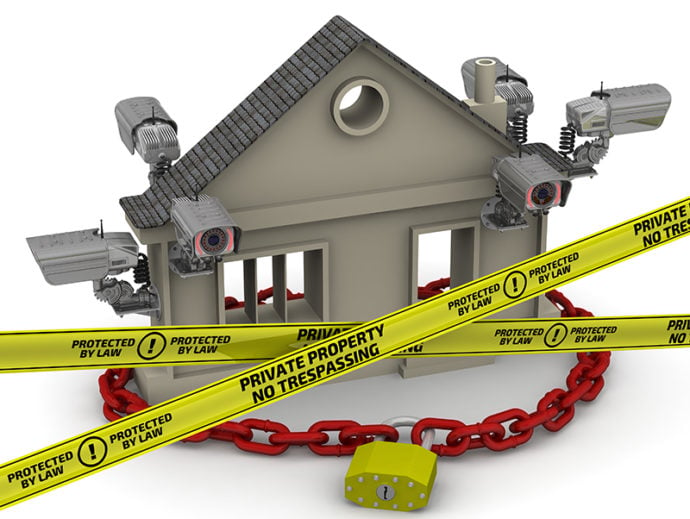With over 4,000 known blighted properties in New Orleans, and probably an additional 10,000 not yet declared blighted, city officials have recently discovered they can bring in new revenues from code violation fines. The fines force property owners to make repairs which eventually brings in more revenue to the City because repairs lead to higher property values and higher assessments. For example, one commercial property was assessed $100,000 in fines, which were paid in order for Ochsner Hospital to develop a clinic there.
This means there is a good chance your commercial property can be cited for code violations, even if you believe your property is in good shape. What will surprise you is the amount of the fines, which can easily be $5,000 to $10,000 per property. The 1,281blighted property judgments during the last 6 months in New Orleans brought $6.4 million annually into the City coffers. This article explains what to do when Code Enforcement knocks on your door wide commercial property code violations.
Don’t Throw Away Code Enforcement’s Letter
The first step is usually a complaint from your neighbor or maybe even be someone interested in purchasing your property because they want to discourage you from owning it. All they have to do is call city and file an anonymous complaint over the phone to say your grass is too high, or your windows are covered with advertising, or your dumpster is not behind a fenced in area, or any complaint in almost 50 various categories of disrepair. A phone call prompts a city employee to inspect the property but you will never know when the property has been inspected, or who the inspector is. If an active code violation case does not already exist for your property, Code Enforcement creates a case which you can follow on most websites such as BlightStatus.
Code Enforcement employees perform a detailed inspection of your building exterior and parking lot conditions, taking lots of pictures and making lists of all violations of City ordinances. The average time from a complaint and creation of a case to inspection is 30 days and after an inspection is completed and violations have been documented, the Hearings Bureau performs title research to notify owners. This is where you will receive a notice of a hearing date and a list of the code violations. The hearing must be at least 30 days from when the notice is mailed to you.
The Hearing From Hell
The hearing is a review of the code violations and a decision will be made at the end of this hearing to impose fines. This is a 5 to 10 minute hearing in a small room. It is rushed. You can bring an attorney, but be prepared to get verbally abused on why your property is in disrepair. You are not allowed to speak much and any defense of your excuses will be ignored. It is not a negotiation. The hearing is conducted by a code enforcement employee and a city employee who represent the mayor’s office. The person who inspected your property is not in attendance. There is a stenographer taking notes and the meting is recorded, but you do not get a copy. You have to file a Freedom of Information Request to get the recording of your hearing.
Map of New Orleans Property Inspections
4,177 properties have been inspected the last 6 months
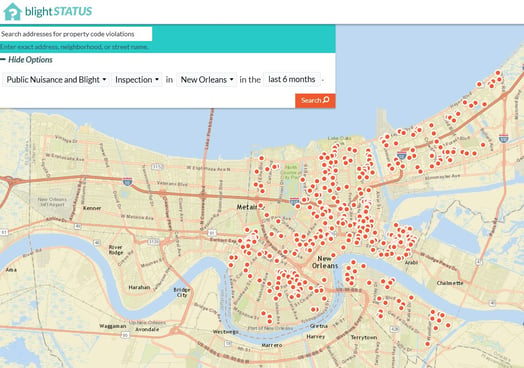
The code enforcement employee has not inspected your property, but will display photographs of code violations from the inspector’s report. The code enforcement employees won’t review the photographs in detail nor explain exactly where on the property the violations occurred, because they were never on your property. They are using the inspector’s report of violations, but the inspector is not present. If you ask the officer to review the photographs and show where the violations are, they will tell you to give the list of violations to your contractor who will tell you what needs to be fixed.
There will be lots of code violation-possible 20 to 30 in all-even if your property is in good condition. If you try to explain why there are code violations, you will be shushed by the mayor’s representative. You will be told there is no more time and that they have to move on to other cases. They will conclude by fining you up to $500 for each of the single code violations, which usually totals $5,000 to $10,000, and put a lien against your property so it can’t be sold unless the fines are paid. An attorney working in the Code Enforcement Department, who you will never be allowed to contact, may at their discretion place your property in a sheriff’s sale so proceeds can be used to satisfy the fines.
Map of New Orleans Property Code Violations
3,361 properties have code violations
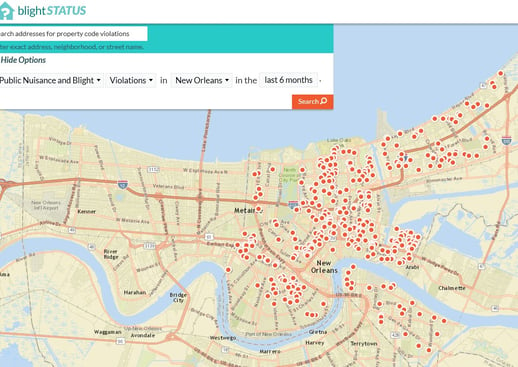
After The Hearing Is Consummated
A hearing officer may postpone the hearing to a future date which usually is not set for a definite date if they feel there is work in progress. The officer may also dismiss the case based on evidence presented at the time of hearing, and the code enforcement hearing officer has total discretion. If a property remains in violation of the City ordinances, a Notice of Judgment will be issued to the owner and, if not appealed or paid in full, will be filed with the recorder of mortgages 30 days after the hearing. This filing will constitute the lien on the property and will give the City the authority to remediate the violations and seize the property for Sheriff Sale. Here is a list of properties already set for sale.
Map of New Orleans Property Code Violation Hearings
2,482 properties were subject of a hearing
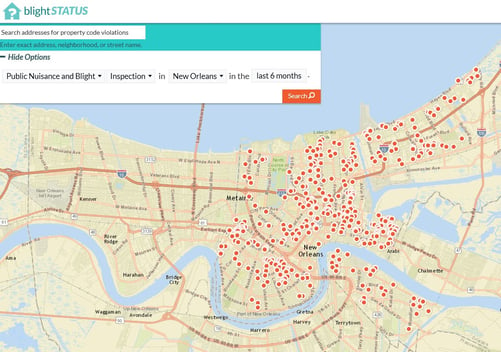
Vague Code Violation Law Can Apply To Most Any Property
The current housing code dates back to 1995 when Mayor Marc Morial recodified the 1956 Code of Ordinances and established 170 chapters of law on how the City would operate. The housing code is written with vague language and could apply to almost any commercial property. Here are some examples:
Chapter 26, Article 4, Section 26-159 states: All sidewalks, walkways, driveways, parking spaces and similar areas shall be kept in a proper state of repair and maintained free from hazardous conditions, including but not limited to, deterioration, deformation, fractures, fissures, spalling, or detached, dislodged or failing connections.
Spalling means a break in your sidewalk. So you could be in violation of this code if your sidewalk is in disrepair.
Chapter 26, Section 26-151 states: All structures and exterior property shall be kept free from rodent harborage and infestation. Where rodents are found, they shall be promptly exterminated by approved processes which will not be injurious to human health. After extermination, proper precautions shall be taken to eliminate rodent harborage and prevent re-infestation.
The problem with this violation is that rodents do not have to be found, despite the language saying differently. The inspector will list you in violation of this code regardless.
Sec. 26-167 states: All exterior surfaces, including but not limited to: doors, door and window frames, cornices, porches, trim, balconies, decks, and fences, shall be maintained in good condition.
Good condition seems pretty arbitrary. You’ll be in violation of this code for sure.
Sec. 26-184 states: All interior surfaces shall be maintained in a good, clean and sanitary condition. Peeling, chipping, flaking or abraded paint shall be repaired, removed or covered. Cracks or loose plaster, decayed wood and other defective surface conditions shall be corrected. Holes in interior walls shall be sealed as necessary.
Interior wall holes shall be sealed, and no peeling or flaking paint. It’s a good code but open to interpretation. The inspector will find you in violation of this for sure even though they have not seen the interior.
Sec. 26-179 states: Every window, skylight, door and frame shall be kept in sound condition, good repair and weather tight. All glazing materials shall be maintained free from substantial cracks and holes. Every window, other than fixed windows, shall be operable and capable of being held in position by window hardware.
Every window operational? Not in a 100 year old house where windows have 7 coats of paint sealing them shut for the last 30 years.
Map of New Orleans Property Code Violation Judgements
1,281 properties were fined
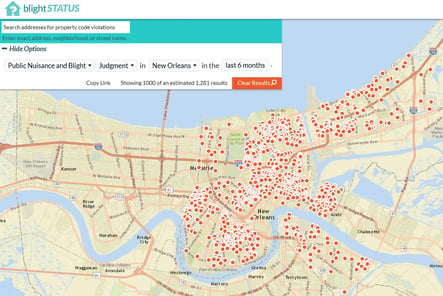
Before and After 30 Days of Your Code Violation Hearing
After the hearing but within 30 days:
- Present photographs showing that all violations have been fixed, and photos of the front, rear, and right and left side of the structure.
- Provide proof of permits and Certificate of Completion and/or Certificate of Occupancy from the Department of Safety and Permits.
You still have to pay the fines, but this will stop the sheriff’s sale.
More Than 30 days after the hearing
- After 30 days, waiver of daily fines will only be considered upon submission of a completed Lien Forgiveness Request Form.
- Forgiveness of partial fines is considered when the property in question has been brought into full compliance with the City housing code.
- The code enforcement employee has total discretion.
Summary- 8 Things To Immediately Do When Accused of Code Violations
Immediately upon receiving notice of the hearing for code violations, call or visit the Code Enforcement Department. Ask for the email address for the person who sent you the hearing notice. Get the violations fixed and send the hearing officer the following documents, before the hearing date.
- CURRENT clear printed photos of the property in compliance. Photos should include front, right and left sides and have the date it was taken printed on the photo.
- Recently executed contracts for repairs.
- Permits covering the scope of work that has been performed.
- Certificate of Completion indicating that work performed under a permit.
- Certificate of Occupancy indicating that work was completed.
- Certificate of Appropriateness if the property falls within the historic district of HDLC.
- Proof of committed financing for repairs or new construction.
- Documents proving your ownership interest in the property including Bill of Sale.
But don’t wait until the hearing. You can email the documentation to the code enforcement officer in hopes of having the hearing reset or violations cancelled.
About the Author:
Managing Director, Louisiana Commercial Realty, LLC
robert@louisianacommercialrealty.com
